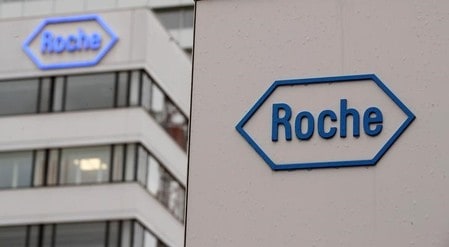ZURICH (Reuters) – Swiss drugmaker Roche’s hopes of recapturing lost ground in the generics-flooded influenza market got a boost after a late-stage study showed its new medicine reduced symptoms in people at high risk of complications.
Some analysts, however, have only muted expectations for the drug, baloxavir marboxil, since previously published results showed modest benefit compared to Roche’s older Tamiflu medicine that is already under pressure from cheaper copies.
In severe flu outbreaks, millions of people can get sick, resulting in hospital treatment and potentially hundreds of thousands of deaths, in particular among older people or those with compromised immune systems.
Roche’s Capstone-2 trial focused on adults aged 65 or older, or those with conditions such as asthma, chronic lung disease, diabetes, or heart disease. The company said on Tuesday that baloxavir marboxil showed superior efficacy in speeding up improvement of symptoms versus a placebo.
The anti-viral medicine, also called Xofluza, is approved in Japan. U.S. regulators have accelerated their review and could make a decision by Dec. 24.
Roche has partnered with Japan’s Shionogi to develop the single-dose drug, touting it as a more convenient alternative to Tamiflu’s twice-daily, five-day regimen.
In 2017, Tamiflu sales tumbled 33 percent to 535 million Swiss francs ($536.99 million), as cheaper generics muscled in.
“Baloxavir marboxil is the first antiviral to show a clinically meaningful benefit in people who are most susceptible to complications from the flu,” said Sandra Horning, Roche’s chief medical officer.
Roche did not give specifics for the Capstone-2 study results, saying it would submit them to healthcare authorities.
In a previous trial, however, the medicine reduced the duration of flu symptoms on par with Tamiflu to about 2.2 days, a day earlier than in patients getting a placebo.
That study did show the new drug reduced the period in which a person is contagious, compared with the placebo and Tamiflu.
GENERICS DOMINATION?
Roche shares showed little reaction, slipping 0.7 percent by 0940 GMT.
Some analysts say limited benefits compared with Tamiflu would be unlikely to cause a sea change in flu treatment.
“We see the bulk of the flu market further dominated by Tamiflu generics,” analysts at Baader Helvea said on Tuesday, saying it had likely only a niche future for high-risk patients.
Still, peak annual revenue estimates for baloxavir marboxil vary wildly.
While Baader Helvea projects 150 million Swiss francs ($151 million), mostly at the expense of Tamiflu sales, Zuercher Kantonalbank was more optimistic, saying revenue could top out at 1 billion francs.
Bank Vontobel, meanwhile, projects 265 million francs.
Shionogi, with rights to the drug in Japan and Taiwan, will get royalties on Roche sales elsewhere, according to their 2016 licensing deal.
($1 = 0.9963 Swiss francs)
(Reporting by John Miller; Editing by Kirsten Donovan and Keith Weir)


